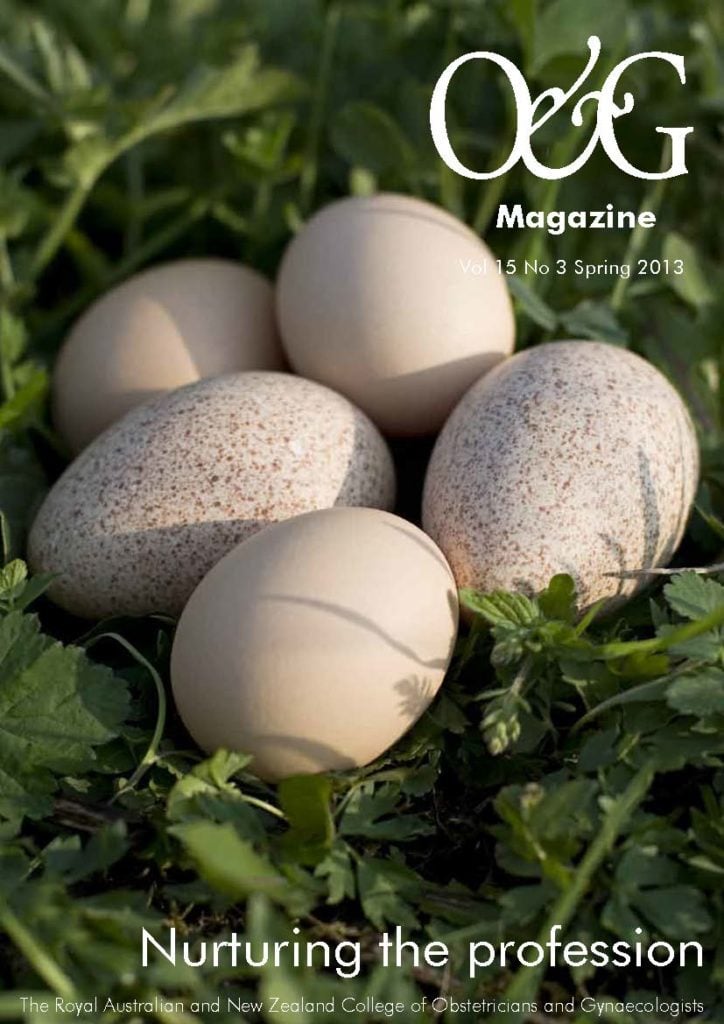‘Not all of us can do great things. But we can do small things with great love.’ Mother Teresa
I graduated as a specialist obstetrician and gynaecologist in Australia in 1993. During my training and in the 20 years since, our specialty has always been either ‘in crisis’ or ‘at the crossroads’. I recall times when it was difficult to encourage young doctors to choose to train in O and G as a result of a combination of medical indemnity problems and relative underpayment for specialist services. Fortunately, it appears that there are enough young doctors who continue to want to train in the specialty, but it remains important to ensure that the profession is helped to adapt and flourish in a changing health system.
It is clear to all practitioners of our specialty that it comes under scrutiny more than most disciplines and to outsiders it would seem that we face many challenges in an evolving health system. The emergence of midwifery as an autonomous profession has brought with it associated challenges in defining the role of the obstetrician, in general, and also in individual practice. Whereas previously it was taken for granted that obstetricians were the clinicians assuming responsibility for pregnancy care, an increasing amount of that care is now provided by midwives. It might be easy to assume that with this shift there is a diminished importance of the obstetrician, but in reality the challenge lies in how obstetricians work with their colleagues. While still the backbone of maternity care in rural areas GPs have, for better or worse, ceased providing routine pregnancy care in metropolitan areas, so referral to an obstetrician from a GP meant, in the large majority of cases, transfer of all care for the duration of the pregnancy and birth. In some instances care was shared, but there seemed little controversy regarding the roles of the collaborating doctors, who had absorbed the medical model of training and escalation to the specialist when necessary.
That model of care is gradually changing, with increasing focus from governments on midwifery primary care models, both in hospital maternity units and in private practice. At first this might seem a threat to our profession, but of course it is not. It is a challenge to us to continue to place women at the centre and focus of our work. I personally have seen these changes confirm how important the work of an obstetrician is to maintain a safe system of maternity care in Australia and New Zealand.
There remains another important issue that requires the attention of governments and RANZCOG. That is support for our rural colleagues. The issue of the difficulties faced by doctors in rural areas remains a huge challenge. It is not always clear how rural O and G practice can be best supported, but it is crucial that it is. In this area, it is clear that the role of the GP obstetrician will be fundamental in maintaining rural maternity services, and our representatives must support and augment efforts to develop the rural generalist pathways. It will be necessary to provide opportunities for those doctors who are working towards a rural career to obtain training and support from obstetricians in metropolitan hospitals, for at least some of their training, and support once they have entered the rural workforce. RANZCOG has been successful at such support in the past, but it is important that this effort continue and be expanded in the future.
What is required from us as individual specialists to nurture our profession in the future?
- Take care to ensure medical students continue to receive appropriate exposure to obstetrics as undergraduates, especially in intrapartum obstetrics. It is very easy for medical students to be elbowed aside in birth units unless obstetricians and midwives positively support their education there. All specialists have an obligation to teach students. If you see an enthusiastic student, nurture this enthusiasm. Offer to call them for any births you are attending and, where appropriate, allow them to participate in the labour and birth. Maybe only one in 20 will embrace this opportunity, but they are gold for – and the future of – our profession.
- Support vocational specialist training. RANZCOG does a good job in defining training requirements and balancing in its deliberations what is ideal for our Trainees and realities of maternity care systems. All specialists have an obligation to support specialist training. In my health district maternity service, there are 20 full-time midwifery educators to ensure midwives receive education and training. There are no full-time O and G educators. I am not lamenting this difference, but it is crucial that every specialist takes up the challenge of educating our Trainees. It is important to allow Trainees to perform as much surgery as they may perform safely under your supervision. When asked who will perform an operation by a patient (public or private) tell them all surgery is a team effort, with the senior and junior specialist required to perform various parts of the operation. Assure your patient that the senior specialist will perform any necessary surgery in the woman’s interest, and allow the Trainee to perform as much as is safely possible under your supervision.
- Participate in the numerous committees and meetings that underpin clinical governance of your unit. We lament when we are disengaged and not listened to by hospital administrators. The corollary must be that we positively engage and participate in the quality, safety and administrative functions of the hospital. I have seen too often that a significant proportion of consultant staff is content to leave this important work to a small number of usual suspects. Our Trainees are strongly influenced by the workplace culture they witness every day. It is crucial that all specialists accept the importance of involving themselves in the governance of their workplace.
- Continue to support your colleagues. I believe this is done very well, by and large. Call for help when necessary and offer to assist, when possible, in difficult and stressful cases. There is nothing that helps the principal surgeon in a difficult case more than the reassuring presence of a second senior specialist, even if the second specialist is only assisting.
- Be prepared to intervene when there is unacceptable behaviour. We usually give our colleagues the benefit of doubt when things don’t go as they should. Most specialists will themselves change if they perceive disapproval from their colleagues. But in the rare instances of unacceptable behaviour, or when a pattern of unacceptable outcomes becomes manifest, use the appropriate mechanisms to report the clinician involved. I would have to say that this is the aspect of our professional lives that we do more poorly than any other, and when allowed to continue harms women, their babies, the institution, the profession and, ultimately, the offending individual.
- Don’t be a stick in the mud. The world is changing, as it always has. We don’t practise in the same way as previous generations of O and Gs did, and future generations won’t practise as we do. Whether it will be because of a changing emphasis on work-life balance assumed by our younger specialists, or changing work patterns associated with newer models of care, be prepared to accept change and don’t discourage innovative practice models when others develop them.
I have always considered O and G as the best job in the world. By nurturing the profession, we can ensure it always will be.





Leave a Reply